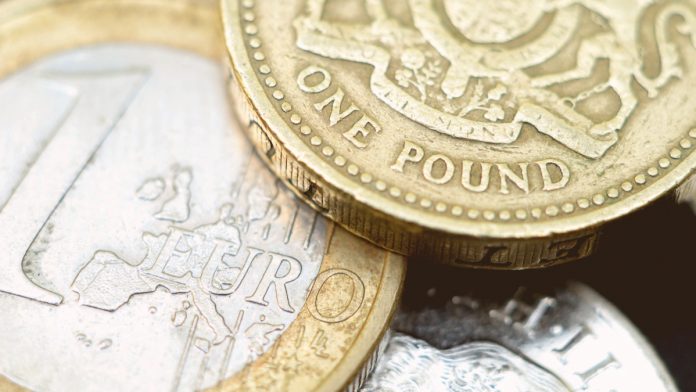- Pound (GBP) is set for weekly gains
- Lloyds expects house prices to fall 8%
- Euro (EUR) fell after ECB hiked rates
- German CPI and eurozone consumer sentiment
The Pound Euro (GBP/EUR) exchange rate is falling after strong gains in the previous session. The pair rose 0.6% yesterday, settling at €1.1602 after trading in a range between €1.1508 – €1.1618 across the session. At 05:45 UTC, GBP/EUR trades -0.13% at €1.1588. The pair is set to rise 1.1% this week after falling 0.25% last week.
The pound resumed its rise again on Thursday after data from the Confederation of British Industry revealed that sales rebounded this month, which was a welcomed improvement after most consumer gauges point to ongoing weakness. The CIB’s monthly retail sales balance rose +18 in October up from -20 in September. Still, this is likely to be a one-off rather than the start of a new trend.
Separately, Lloyds bank, which is considered a bellwether for the UK economy, released quarterly results which point to a bleak outlook. Lloyds, the UK’s largest lender, forecasts an 8% fall in house prices next year as high-interest rates will see demand dry up.
There is no high-impacting UK economic data due to be released today. The focus will be on earnings from NatWest, another key lender in the UK mortgage market.
The euro fell yesterday following the European Central Bank monetary policy meeting. The ECB raised interest rates by 75 basis points, as expected. This was the third straight hike and the second hike of 75 basis points, taking the benchmark rate to 1.5%, the joint highest rate in the eurozone’s history.
The ECB is looking to tackle inflation which has risen to 9.9% a record high. However, the economy is also on the brink of recession if it is not already in recession.
Today there is plenty of data for investors to digest, including French inflation and GDP, Eurozone economic sentiment and German inflation. German inflation is expected to rise to a fresh record high of 10.1% year on year, up from 10%. High inflation could support a more aggressive stance from the ECB.
Meanwhile Eurozone economic sentiment is expected to fall further to 92.5.





